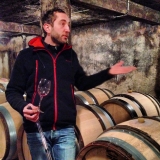Antoine Lienhardt
If you are a Burgophile who simply wants excellent
Pinot but are unconcerned with labels, Antione Lienhardt's wines will be just
what you are looking for since, as most of the range comes from the humble Côte
de Nuits, these are wines that punch well above their weight without breaking
the bank.
As always in Burgundy (and elsewhere for that
matter), it is the producer's name that is paramount and, until now, I hadn't
heard of Antoine Lienhardt. Neither, for that matter had Burgundy expert Bill
Nanson when I asked him if he had any experience of these wines. This is not
altogether surprising as Antoine only took over the vineyards of his
grandfather, Maurice Guyot, starting with the 2011 vintage. Prior to that, the
vineyards had been in long-term lease since M. Guyot's retirement in 1992.
Wine lovers, and especially lovers of Burgundy who
are familiar with our range, will be more familiar with the wines of Antoine's
partner, Juliette Joblot whose father, Jean-Marc is often credited for
single-handedly putting the Givry appellation on the map (and for that matter
the whole Côte Chalonnaise).
More...
Object required Sorry, but a serious database error occurred. It is not possible to continue. Please report to error to support. |

|
The Big
Red
Wine Company
|



|
|
Home | Wines | Producers | New | En Primeur | Bin Ends | List | Mailing List | Services | Blog |
